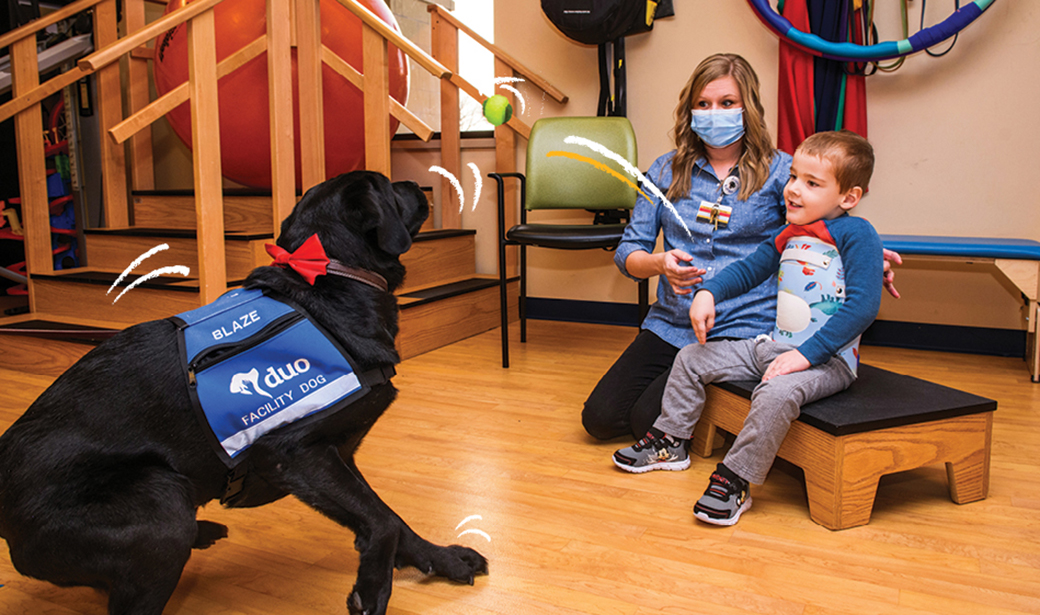Brody Moreland is only 4, but he has a vocabulary beyond his years. He enjoys chatting with adults and isn’t shy about letting them know exactly how he feels.
“He’s a very strong and opinionated 4-year-old,” said his mother, Ally Moreland, a Centralia resident.
So, in late 2021, when Ally and her husband, Taylor, considered whether Brody would benefit from 3 hours of therapy per day in MU Health Care’s Tiger Intensive Therapy program, they were made very aware of his negative feelings on the matter. Brody was born with spina bifida, a condition in which the spinal cord doesn’t form properly. He doesn’t have feeling in his legs, and he needs lots of practice mastering body control skills.
“It’s hard for Brody, because he’s had a lot of therapy, either in a clinic or home, throughout his four years of life,” said Melissa Rentfrow, a physical therapist who works with Brody at the Children’s Therapy Center. “He had been getting to a point where he just didn’t want to do it anymore. He was kind of over it.”
A dog changed Brody’s mind.
Blaze, a 2-year-old black lab who loves kids as much as he loves chasing tennis balls, is the Children’s Therapy Center’s facility dog. When Brody wheeled into the center, he met a new friend who would help him tackle his tasks.
“The first day he got to play with Blaze, Blaze was his reindeer, because it was before Christmas,” Ally Moreland said. “The dog helped a lot. Brody has a 2-year-old brother who doesn’t have to come to physical therapy, so Brody wonders why he has to do it when he has other things he could be doing that he enjoys, like preschool. He has to work really hard at physical therapy, and I think having motivation is the biggest part.
“He gets very excited and talks a lot about Blaze and tells everybody he meets that he gets to play with Blaze at the therapy center.”
Studies have shown that interacting with pets can reduce anxiety, pain and blood pressure. MU Health Care believes in the healing power of pooches.
Since 2018, Link, a golden retriever, has served as the facility dog at Children’s Hospital, brightening the days of young patients. Rhett, a black lab, has been the facility dog at the Thompson Center for Autism and Neuromuscular Disorders for nearly seven years. MU Health Care also has the WAGS program, which includes a wide variety of trained and certified dogs — all owned by volunteers — who make hospital visits.
Kelsey Okruch, the manager of outpatient pediatric therapy at the Children’s Therapy Center, thought the patients at her facility would benefit from a specially trained four-legged employee. Okruch and three of her colleagues went through their own training to teach them how to get the most out of their new helper.
Blaze spends his evenings with physical therapist Rachel Hughes, and she brings him to work each weekday for his 8 a.m. to 5 p.m. shift. A sign at the front desk lets patients know when Blaze is available to participate in therapy sessions or to play afterward as a reward for their hard work.
“He’s pretty silly — he’s got the right amount of dog in him,” Okruch said. “When he’s relaxing in my office, he’s fun and playful. We go out on the playground around lunch time and let him run around. He gets super excited when he sees his tennis ball and knows it’s time to go out and play. But when it’s time to work, he can put on his game face and follow commands.”
Blaze’s job is to make therapy fun for kids.
“Not only does he provide emotional support, he helps with some of our sessions,” Okruch said. “He’s been able to help kids with walking and gait training. He’s able to hit a switch with his nose and interact with kids by playing with toys. Kids think it’s hilarious and cool that he can turn a toy on. We’re working with kids on learning cause-and-effect and following instructions, and when you have a dog that does it, it’s even more exciting and motivating for them.”
When Rentfrow and Blaze work with Brody, they focus on him improving his core strength by sitting up and speaking loudly, with commands like, “Blaze, come. Blaze, sit.” Brody also practices reaching and throwing by picking up tennis balls and tossing them to Blaze, who is an expert at snagging them in the air. Rentfrow sprinkles those activities around other exercises that help Brody build strength and coordination to get in and out of his wheelchair and perform daily tasks.
“Brody forgets that he is even doing therapy,” Rentfrow said. “He says, ‘I’m going to go see Blaze.’ That’s what we want for our kids. We don’t want them to think they’re working while they’re here. Blaze adds such a sense of normalcy to being here. It’s not a scary clinic. It’s a house with a really friendly dog.”



